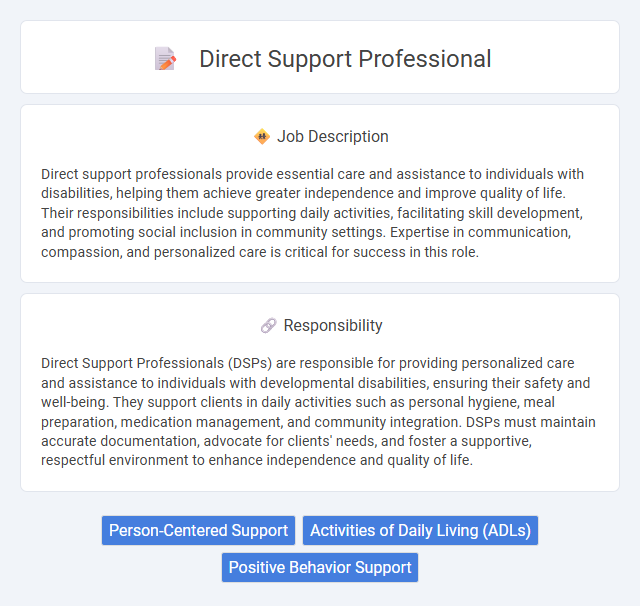
Direct support professionals provide essential care and assistance to individuals with disabilities, helping them achieve greater independence and improve quality of life. Their responsibilities include supporting daily activities, facilitating skill development, and promoting social inclusion in community settings. Expertise in communication, compassion, and personalized care is critical for success in this role.
Direct support professionals often work with individuals who have physical, intellectual, or developmental disabilities requiring personalized care and assistance. Those with strong empathy, patience, and effective communication skills will likely be suitable for this role, as it demands understanding diverse needs and promoting independence. People who prefer structured environments and clear routines may find this job challenging, given the variability in clients' conditions and daily requirements.
Qualification
Direct Support Professionals (DSPs) require specialized training in areas such as behavior management, communication techniques, and health care procedures to effectively support individuals with disabilities. Certification programs and state-mandated qualifications often include CPR, first aid, and tailored instruction in person-centered care. Strong interpersonal skills, patience, and a commitment to advocacy are essential qualities that enhance a DSP's ability to provide compassionate and effective assistance.
Responsibility
Direct Support Professionals (DSPs) are responsible for providing personalized care and assistance to individuals with developmental disabilities, ensuring their safety and well-being. They support clients in daily activities such as personal hygiene, meal preparation, medication management, and community integration. DSPs must maintain accurate documentation, advocate for clients' needs, and foster a supportive, respectful environment to enhance independence and quality of life.
Benefit
Direct support professional jobs likely offer significant benefits including competitive wages and access to health insurance. Employees probably receive paid time off and opportunities for career development in healthcare fields. Job satisfaction might be high due to meaningful work supporting individuals with disabilities.
Challenge
Direct support professional roles likely present significant challenges due to the need to address diverse client needs while maintaining patience and empathy. The probability of encountering complex behavioral situations requires strong problem-solving skills and adaptability. Managing these challenges effectively may lead to fulfilling outcomes for both the professional and the individuals supported.
Career Advancement
Direct Support Professionals (DSPs) can advance their careers by obtaining specialized certifications such as Certified Rehabilitation Counselor (CRC) or Board Certified Behavior Analyst (BCBA). Gaining expertise in fields like mental health, developmental disabilities, and crisis intervention opens pathways to supervisory or management roles. Employers also value DSPs who pursue continuing education and leadership training to enhance service quality and operational efficiency.
Key Terms
Person-Centered Support
Direct Support Professionals (DSPs) provide person-centered support by tailoring care plans to meet the unique needs and preferences of individuals with disabilities. They empower clients to achieve greater independence through personalized assistance in daily activities, skill-building, and community inclusion. Effective DSPs prioritize respect, dignity, and client-driven goals to enhance quality of life and promote autonomy.
Activities of Daily Living (ADLs)
Direct support professionals (DSPs) provide essential assistance with Activities of Daily Living (ADLs) such as bathing, dressing, grooming, and feeding to individuals with disabilities or special needs. They ensure clients maintain personal hygiene, manage medication schedules, and support mobility to enhance independence and quality of life. Expertise in ADL support is crucial for promoting safety, dignity, and overall well-being in community and residential settings.
Positive Behavior Support
Direct Support Professionals (DSPs) specializing in Positive Behavior Support (PBS) implement evidence-based strategies to enhance quality of life and reduce challenging behaviors in individuals with developmental disabilities. They conduct functional behavior assessments, develop personalized intervention plans, and provide ongoing support that promotes skill-building and positive social interactions. Expertise in PBS enables DSPs to foster environments that encourage independence, emotional well-being, and community integration.
 kuljobs.com
kuljobs.com